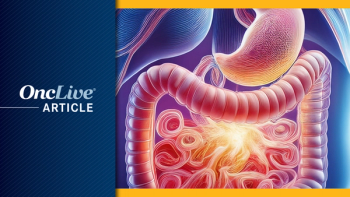
Goals of Therapy in Metastatic Gastric/GEJ Cancer
Transcript:
Manish Shah, MD: The goals for treatment in metastatic disease are typically to control the disease and maintain or improve quality of life. There are options, and that’s a great thing. We have more and more drugs that are approved for the disease, and we have to begin thinking about sequencing therapy, which is much like what we do for colon cancer. As a GI medical oncologist, we’re used to that, but it’s something that you need to think about. Most patients are likely to get a second- and third-line therapy, so I’m not sure using a 3-drug regimen in the first-line setting adds that much value, but it does add toxicity.
In terms of 3-drug therapy, the clinical trial data started with the DCF (docetaxel, cisplatin, fluorouracil) regimen, which was published in 2007. That regimen is almost never used at this point because of toxicity: 80% of patients develop grade 3 neutropenia, mucositis, and diarrhea. It’s a tough regimen, but it did improve survival over a 2-drug regimen. The argument from our Asian colleagues was always that if you could sequence therapy, you could get the same or better survival, and I think that may be true. But since the DCF regimen was so toxic, there have been many efforts to try to improve that regimen to mitigate toxicity and perhaps improve outcomes. We actually published, a couple of years ago, the modified DCF regimen, which is a 48-hour infusion of 5-FU administered with docetaxel and cisplatin. That 3-drug regimen was compared with DCF in a phase II setting, and it really had compelling data or compelling outcomes. Median survival was 16 months, which is really quite impressive.
The FLOT regimen developed in Germany is a similar regimen. The differences are as follows: The 5-FU is not a 48-hour infusion but a 24-hour infusion, so it’s high-dose 2600 mg/m2 IV continuous infusion over 24 hours; oxaliplatin instead of cisplatin. That FLOT regimen is also very active in the metastatic setting. I think in select cases, you might consider a 3-drug regimen, but most patients would get a 2-drug regimen. In the second-line setting, we ask the same questions in terms of goals of care. I think depending on performance status and comorbidities, most patients would get a second-line regimen Most often it’s Taxol (paclitaxel) and CYRAMZA, which is ramucirumab. Ramucirumab is the second targeted agent that was approved in gastric cancer. It’s a VEGFR2 inhibitor, and it has clear activity.
If they progress on that and are PD-L1-positive, then pembrolizumab is an option. If PD-L1-negative and they are still a candidate for therapy, then we typically would go to irinotecan. I would say that this typical sequence of treatment options is likely to change as we get more drugs approved in the disease.
About 5 years ago, the TOGA study demonstrated the efficacy of the addition of trastuzumab to cisplatin and 5-FU, or cisplatin and capecitabine, in HER2-positive gastric cancer. Just like in breast cancer, HER2 is a membrane-bound receptor that acts as a co-receptor for HER1, HER3, and HER4. It actually drives cell division and cell survival. So, blocking HER2 has a therapeutic advantage, and that’s what the TOGA study showed. Ever since then, for HER2-positive patients, trastuzumab really should be considered. That’s now standard as part of our practice. We check all patients for HER2 expression, initially by IHC; if they’re HER2-positive by IHC, we also do FISH testing. And if they’re FISH-positive, then we are able to give trastuzumab.
HER2 activation and its significance is different in gastric cancer and breast cancer. In breast cancer, you often continue trastuzumab into second- and third-line treatments, but in gastric cancer, there are no data to support that. In fact, the second-line studies for gastric cancer, both with lapatinib and with T-DM1 (trastuzumab emtansine), have been negative. I think that our best option is to try to use trastuzumab in the first-line setting, and if patients progress, discontinue HER2-targeted therapy and move on to standard second-line therapies.
Transcript Edited for Clarity



































